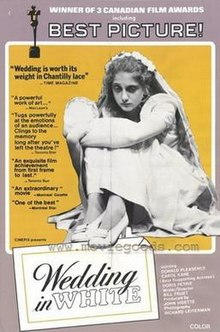Wedding in White
| Wedding in White | |
|---|---|
 | |
| Directed by | William Fruet |
| Written by | William Fruet |
| Produced by | John Vidette |
| Starring | Carol Kane Donald Pleasence Doris Petrie Doug McGrath Paul Bradley |
| Cinematography | Richard Leiterman |
| Edited by | Tony Lower Edwin Watkins |
| Music by | Milan Kymlicka |
Production companies | Cinépix Film Properties Dermet |
Release date |
|
Running time | 103 minutes |
| Country | Canada |
| Language | English |
Wedding in White is a 1972 Canadian drama film written and directed by William Fruet, based on his earlier play. The film stars Carol Kane, Donald Pleasence, Doris Petrie, Doug McGrath, and Paul Bradley.
Synopsis[edit]
Set during World War II, in a small (unnamed) Ontario community, the film stars Carol Kane as Jeannie Dougall, a teenager who is raped by Billy (Doug McGrath), a friend of her brother Jimmie's (Paul Bradley), while the two men are home on furlough. She subsequently struggles against the harsh and cruel reaction of her parents Jim and Mary (Donald Pleasence and Doris Petrie) when she discovers that the incident has left her pregnant; Jim's proposed solution to the dilemma is to marry Jeannie off to Sandy (Leo Phillips), an old army friend of his who is in his 60s.
The play and film were inspired by a real woman Fruet met in his youth, who had been forced to marry an older man by her parents in the same circumstances.[1]
Reception[edit]
In a 1973 review for the Chicago Sun-Times, Roger Ebert awarded the film four stars out of four, praising the film's cast and writing that, "We don’t feel we’re being told a story; it’s more like we’re glimpsing the small joys and tragedies of unfortunate relatives. The movie, which won the Canadian film festival, works so well, I think, because the performances are good; this material could never stand being fancied up by overacting." He compared the film's attention to detail to that of Peter Bogdanovich's 1971 drama The Last Picture Show, and likened its portrayal of a character study to Mike Leigh's directorial debut, the 1971 comedy drama Bleak Moments.[2] For The New York Times, Vincent Canby also complimented the film's cast, as well as its period-accurate dialogue, stating, "It is a closely observed chronicle of one family's life, moving and funny and a little scary, full of unexpected stoicism and the kind of boozy jocularity that can suddenly erupt into violence."[3]
Awards[edit]
Wedding in White and Réjeanne Padovani were the only two Canadian films screened at the 1973 Cannes Film Festival.[4]
The film won the Canadian Film Award for Best Feature Film in 1972.[5]
It was later screened at the 1984 Festival of Festivals as part of Front & Centre, a special retrospective program of artistically and culturally significant films from throughout the history of Canadian cinema.[6]
References[edit]
- ^ "Wedding in White and its novice director". The Globe and Mail, May 27, 1972.
- ^ Ebert, Roger (May 30, 1973). "Wedding in White movie review (1973)". Chicago Sun-Times. Retrieved November 20, 2023.
- ^ Canby, Vincent (April 30, 1973). "'Wedding in White' Views a 40's Family". The New York Times. ISSN 0362-4331. Retrieved November 20, 2023.
- ^ "Le Monde calls Quebec film finest at Cannes". The Globe and Mail, May 17, 1973.
- ^ "Wedding in White voted top film". Canadian Press. Saskatoon Star-Phoenix. 16 October 1972. p. 8. Retrieved 9 December 2012.
- ^ Carole Corbeil, "The stars are coming out for Toronto's film festival". The Globe and Mail, September 6, 1984.
External links[edit]
- 1972 films
- 1970s Canadian film stubs
- 1972 drama films
- Canadian drama films
- English-language Canadian films
- Films based on Canadian plays
- Films directed by William Fruet
- Films set in Ontario
- Films set in the 1940s
- Best Picture Genie and Canadian Screen Award winners
- Films about rape
- 1970s English-language films
- 1972 directorial debut films
- 1970s Canadian films
